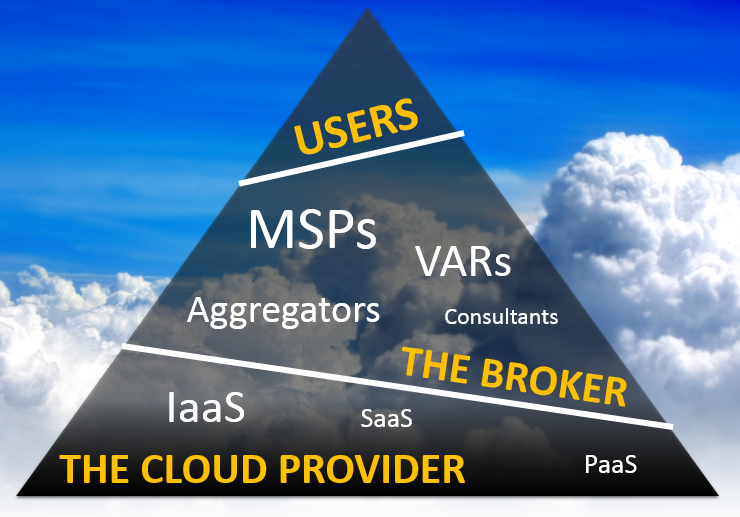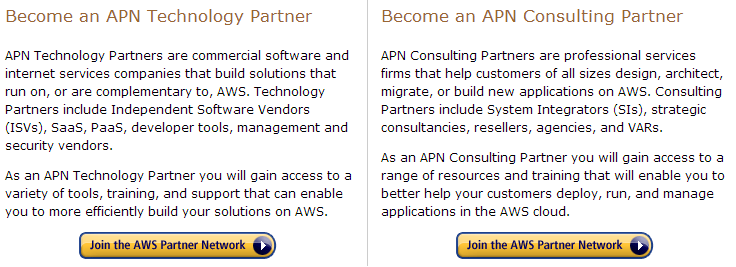 Cloud brokers were recognized and described by Gartner analysts as the `Intermediary services that support fast cloud adoption`. From their customers’ perspectives cloud brokers are the system integrators (SI) or the `cloud enablers` that support fast adoption and maintenance of cloud technologies. For example, the independent software vendor (ISV) can benefit greatly from a cloud managed service provider (MSP) starting with integrating into the underlying cloud infrastructure, all the way up to the offering stack wrappers, such as service provisioning methodologies’ implementation. From the cloud provider’s perspective, cloud brokers are key customers, value-added resellers and aggregators of its cloud services.
Cloud brokers were recognized and described by Gartner analysts as the `Intermediary services that support fast cloud adoption`. From their customers’ perspectives cloud brokers are the system integrators (SI) or the `cloud enablers` that support fast adoption and maintenance of cloud technologies. For example, the independent software vendor (ISV) can benefit greatly from a cloud managed service provider (MSP) starting with integrating into the underlying cloud infrastructure, all the way up to the offering stack wrappers, such as service provisioning methodologies’ implementation. From the cloud provider’s perspective, cloud brokers are key customers, value-added resellers and aggregators of its cloud services.
In this article, I cover the perceptions, evolution and future of cloud brokerage in great detail.
First, an Example: AWS Partners’ Program (APN)
“It (`Amazon Partner Network`- APN) is focused on helping Partners build a successful AWS-based business by providing members of the AWS partner ecosystem with great technical, sales, marketing, and GTM support.”
AWS partners come in two types: the `Technology partner` and the `Consultant partner` as Amazon calls them. While the former includes ISVs (independent software solution vendors) which deliver products that support the AWS consumer cloud operations, the latter includes SIs, MSPs and other professional service agencies that can support the deployment, integration and maintenance within the AWS cloud environment. Amazon already has an impressive figure of 858 of worldwide service agencies or `Consulting Partners` as it calls them.
“Within each of these two partner types, partners can attain one of three progressive performance-based tiers. These three tiers are: Registered, Standard, and Advanced. ” Learn more here.

The AWS Partners’ Program includes a strict set of rules to generate the discipline and scale. That helps the AWS Partners’ Program (APN) guys control the incredible number of partners and its amazing velocity. According to Macquarie analysts, AWS business is growing like crazy, estimated to almost double its revenues, from $2 billion in 2012 to $3.8 billion in 2013. Macquarie also stated that AWS’ growth can come from additional new partnerships and extending current ones.
The cloud giant invests significantly in educating and supporting its partners with their own online portal, co-marketing activities, a great amount of webinars and dedicated events such as a full devoted day as part of AWS Reinvent conference in Las Vegas. The AWS partnership program is an important example to learn from as it demonstrates a new and advanced way to establish and manage an excellent and rapidly growing cloud ecosystem.
Second – How to Choose Your Cloud MSP Wisely? It’s All about Low Cost of Integration
Lowering the TCO (total cost of ownership) in the cloud is a key incentive for enterprises to generate new or move existing workloads within the cloud. The cloud operational costs include the actual cloud resources costs, the initial deployment costs and moreover the ongoing costs for environment maintenance. A veteran cloud MSP CEO once told me that the latter may even be equal to the bill you get from your cloud provider. Whether or not this is true, it is obvious that these ongoing costs have greater risks, as we understand today, these costs are the main cause the traditional IT project high risk of failure.
Cloud operations efficiency develops first and foremost from the capability to generate greater levels of automation in comparison to the traditional data center environment. In the cloud, a single admin/ops guy can manage hundreds and sometimes even thousands of servers. There are many granular areas of automation that you have to take a look at to really be able to fine tune what’s going on. First of all, at the instance/VM level, you need to be able to start the `right size instance` and scale it horizontally to align with the demand. Looking at the requirements on the application level (such as the SLA), you need to consider if it makes more sense for the application to be auto-deployed in a single region, a single availability zone, or maybe go multi-region or potentially, multi-cloud.
This was a long introduction to the fact that in order to achieve the efficiency and get to optimal levels of utilization and availability, the cloud adopter must start with the knowledge and experience that the cloud broker has. Generating low TCO and know-how-to scale without risks might be the key values to serve as benchmarks for successful cloud adoption and the cloud integrator’s professionalism. The professional cloud broker must present proven efficient operations with, most importantly, the knowledge and recognized experience of deploying, integrating and running effective cloud management.
Third – With All That Said, Why are Cloud MSPs Also Cloud Brokers?
Accenture, maybe one of the world wide leading IT integration service vendors, sees itself as a major player in the cloud sphere as a cloud broker. Reuven Cohen, a Contributor at Forbes and Founder of SpotCloud, recently revealed that Accenture
“… [is] investing upwards of $400 million in new cloud computing capabilities. According to the story, the Accenture Cloud Platform will be part of what the company describes as a plan to grow its more than 6,700 cloud focused experts and related cloud services.”
It is only natural that the traditional MSP finds itself transforming into a cloud MSP. The traditional accountability for delivering a complete integrated solution along with being the single contact for an enterprise IT, puts the MSPs in a place where they need to be able to recommend the best matched cloud provider for the enterprise. The recommendation should also cover a specific workload at the granular level. Automation of workload migration between clouds (including the private cloud) generates an extremely complex environment. Cloud brokers must have the knowledge, tools and set procedures in order to generate an efficient and manageable environment for their customers.
Fourth – The Future of Cloud Brokerage
“Cloud brokers will focus on the business of compute rather than the technical organization of compute. And the business of compute has nothing to do with cloud computing or the technology driving this revolution. The business of compute is about the commoditization of compute, network and storage infrastructure” read more
Dr. James Mitchell, CEO of Strategic Blue, who is considered to be one of the most important leaders of the cloud brokerage topic and the founder of Cloud Options (check their demo).
Cloud brokers today function as liaisons between cloud services customers and providers. The cloud broker also acts as a hub of cloud consumers, hence they are the biggest and most important clients to the end cloud operators. This gives cloud brokers the upper hand, so negotiating with an operator on a `reselling` point means better deals and prices for their customers. An IT organization, depending on its size, should not desire to deal and negotiate with cloud providers. This aggregation of cloud resources, together with their added-value services, integration and customization capabilities, places the MSPs today, maybe more than ever, in a high position in the IT market value chain. According to Mitchell, the future of cloud brokerage will be comprised of a plane of online worldwide IT marketplaces for trading IT resources. This vision is wonderful, however, great challenges await to make that happen, such as uniformity across cloud platforms that can enable the workload migration as well as the lack of applications’ interoperability capabilities.
Fifth – The Last Important Note
While leveraging your cloud with MSPs/Brokers has great advantages, mentioned above, keep in mind that the most successful cloud adopters I came across have developed and currently have their own cloud operation capabilities. Every IT organization (specifically ISVs) must create these as core skills while learning how to smartly leverage the cloud brokering (first financial) advantages to generate a successful business from of their cloud.





